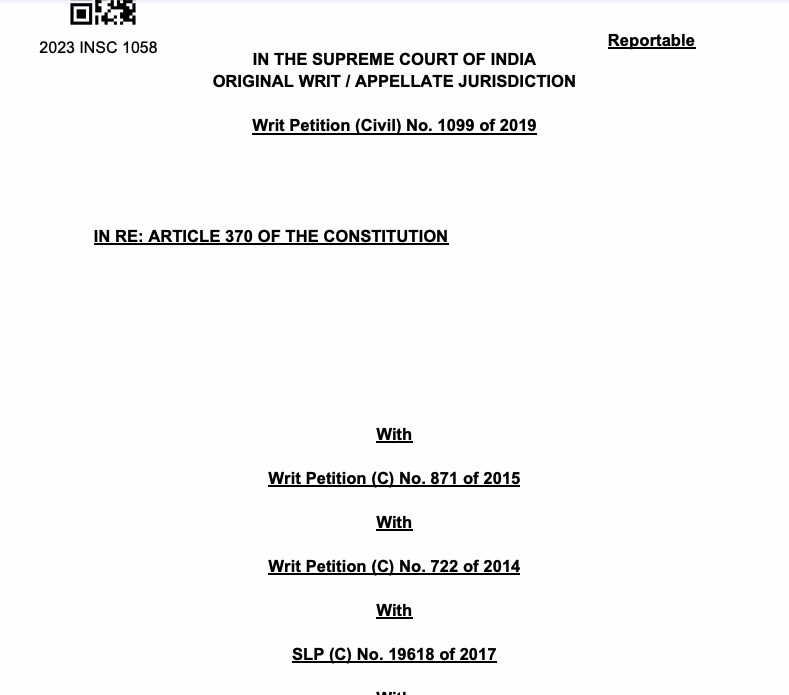[Breaking] SC Upholds abrogation of Article 370, historical day for Bharat-11-12-2023
- The honourable supreme court in its 476 pages judgments had upheld the abrogation of Article 370.
- Advocates appeared for the petitioner(Against abrogation of article370)
- Advocates (ASG) appeared in favour of abrogation of Article 370-
- Submissions- Petitioners
- Submissions by the Opponents (in favour of abrogation)
The honourable supreme court in its 476 pages judgments had upheld the abrogation of Article 370.
On 5 August 2019, the President issued CO 272, the Constitution (Application to Jammu and Kashmir) Order 2019. By the CO, the President in exercise of powers under Article 370(1), applied: a. All the provisions of the Constitution of India by superseding all previous Constitution Orders by which select provisions of the Constitution were made applicable to Jammu and Kashmir either with or without modifications; and
b. Article 367(4) in which a modification was made, changing the term “Constituent Assembly” in the proviso to Article 370(3) to “Legislative Assembly.”
(The author can be reached at shaifaly.ca@gmail.com)
On 5 August 2019, Parliament undertook the following exercise in its capacity as the legislature of the State, since the Proclamation under Article 356 was subsisting:
a. The Rajya Sabha recommended to the President under Article 370(3) that all clauses of Article 370 shall cease to operate:
“That this House recommends the following public notification to be issued by the President of India under Article 370 (3): ‘
In exercise of the powers conferred by Clause (3) of article 370 read with clause (1) of article 370 of the Constitution of India, the President, on the recommendation of the Parliament, is pleased to declare that, as from [*date*], all clauses of the said article 370 shall cease to be operative except clause (1) thereof which shall read as under, namely:
“All provisions of this Constitution, as amended from time to time, without any modifications or exceptions, shall apply to the State of Jammu and Kashmir notwithstanding anything contrary contained in article 152 or article 308 or any other article of this Constitution or any other provision of the Constitution of Jammu and Kashmir or any law, document, judgement, ordinance, order, bye-law, rule, regulation; notification, custom or usage having the force of law in the territory of India, or any other instrument, treaty or agreement as envisaged under article 363 or otherwise.”
The same was also passed by the lok Sabha.
Advocates appeared for the petitioner(Against abrogation of article370)
Following advocates appeared in his case against the abrogation of article 370-
Mr Kapil Sibal, Dr Gopal Subramanium, Mr Zafar A Shah, Dr Rajeev Dhavan, Mr Dushyant Dave, Mr Shekar Naphade, Mr Dinesh Dwivedi, Mr CU Singh, Mr Sanjay Parikh, Mr PC Sen, Ms Nitya Ramakrishnan, Dr Menaka Guruswamy, Mr Muzaffar H Baig, and Mr Gopal Sankaranarayanan appeared for the petitioners. Mr Manish Tiwari, and Mr Warisha Farasat also appeared for the petitioners. Mr Irfan Hafeez Lone and Dr Zahoor Ahmad Bhat were the parties in person.
Advocates (ASG) appeared in favour of abrogation of Article 370-
Mr R Venkataramani, Attorney General, Mr Tushar Mehta, Solicitor General; Mr. Harish Salve, Mr Rakesh Dwivedi and Mr V Giri, Mr Mahesh Jethmalani, Mr Gurukrishna Kumar, Mr Ravindra Kumar Raizada, Mr Bimal Jod senior counsel; Mr KM Nataraj and Vikramjit Banerjee, Additional Solicitor Generals appeared on behalf of the respondents. Mr. Kanu Agrawal, Ms Archana Pathak Dave, Mr VK Biju, Mr Vikram Sharma, Dr Aniruddha Rajput, Mr DV Raina, Mr Rahul Tanwani, Mr Eklavya Dwivedi, Mr Rajesh Bhushan, and Dr Charu Mathur also appeared for the respondents.
Submissions- Petitioners
- It was a political Act.
- No opportunity was afforded to the other parties to demonstrate strength in the house.
- Other parties – the Congress, the PDP and the National Conference – had, in a fax to the Governor expressed willingness to form a coalition.11 It was incumbent upon the Governor to reach out to the parties and explore the possibilities of forming a government
- Section 92 of the Jammu and Kashmir Constitution envisages a mandatory maximum period of six months of Governor’s rule, which cannot be extended any further
- The President’s Proclamation under Article 356 dated 19th December 2018 is void ab initio for the following reasons:
- This was also without basis as the report of the Governor showing the failure of constitutional machinery was not placed before Parliament1
- It renders the federal structure susceptible to the whims of the political party in power.
- The Parliament cannot make irreversible changes in the exercise of this temporary power during the Proclamation under Article 356.21 Dr. BR Ambedkar clarified that the purpose of the power under Articles 356 and 357 was to ensure that the “form of constitution” was maintained.
- This Court in Krishna Kumar Singh v. State of Bihar25 has held that the President’s ordinance-making power cannot be treated as a constitutional equivalent of ordinary legislative power, notwithstanding a deeming provision which confers the same force and effect on it.
- Articles 75 and 164 of the Constitution stipulate that the Council of Ministers is collectively responsible to the Legislature. The State Legislature is vested with certain non-legislative functions such as questions and debates. Such non-legislative functions vested in the State Legislature cannot be exercised by Parliament during President’s rule
- The will of the people finds no expression in the purported concurrence of the State Government, essentially the Governor, since there was no Council of Ministers in place. Thus, the COs are undemocratic for want of public will and public reason
- The word ‘temporary’ in the marginal note, does not refer to the limited duration of time, after which the Article would cease to exist. It implies that unless the specific conditions of its repeal, that is, convening of the Constituent Assembly of the State of Jammu and Kashmir cannot be secured, the Article will continue to operate irrespective of the duration of time.
- Article 370 could only have been repealed by the Constituent Assembly between 1950 and1957. After that, that is after the Constituent Assembly of the State ceased to exist, it can only be amended by way of the procedure specified under Article 368, followed by its extension to the State of Jammu and Kashmir by Article 370(1)(d)
- There was no merger agreement between the Dominion of India and the State of Jammu and Kashmir, unlike other states. The terms of their relationship were defined in the Instrument of Accession44 whereby though certain matters were acceded to the Union; residual sovereignty was retained by the Maharaja in accordance with Clause 8 of the Instrument. This position – that the residual sovereignty vested with the Maharaja was affirmed by this Court as well.
- The Constitution of Jammu and Kashmir is an independent, perpetual document. Since it was not created by the Constituent Assembly, it was neither subordinate to the Constitution of India, nor to Article 370. It cannot be substituted or repealed by an act of the Union Government.
- CO 272 goes beyond mere modification of the provisions of Article 367 and their application to the State of Jammu and Kashmir. It vests the power of a certain kind, meant to be exercised by a certain body, in a completely different body. This is tantamount to changing the fundamental basis of Article 370(3).
- The expression “Constituent Assembly” cannot be substituted with “Legislative assembly
- As such, the provision contains a provision for its own amendment in Article 370(3). When such a specific provision exists, the amendment cannot be done in any other manner.
- The Respondents have erroneously relied on Mohd. Maqbool Damnoo v. The State of Jammu and Kashmir69 to argue that the Constituent Assembly and the Legislative Assemblies are interchangeable. In the said case, the Court had held that the Governor, being the successor to Sadr-i-Riyasat, can exercise the same powers as the latter. The reliance on this case is misplaced70; and
Submissions by the Opponents (in favour of abrogation)
- Mr Dinesh Dwivedi, senior counsel argues that Article 370 was a temporary provision. The interim arrangement in the form of Article 370 ceased to operate after the Constitution of Jammu and Kashmir was enacted. Article 370 ceased to be a source of power for the President, as was originally intended.41 Mr Dinesh Dwivedi disagreed with the proposition that since the Constituent Assembly chose to not recommend the abrogation of Article 370, Article 370(3) would continue to operate after the dissolution of the Constituent Assembly.
Download PDF
If you already have a premium membership, Sign In.
 CA Shafaly Girdharwal
CA Shafaly Girdharwal
CA
New Delhi, India
CA Shaifaly Girdharwal is a GST consultant, Author, Trainer and a famous You tuber. She has taken many seminars on various topics of GST. She is Partner at Ashu Dalmia & Associates and heading the Indirect Tax department. She has authored a book on GST published by Taxmann.













